A+ Grades
Having problems with assignments? Tough exams? Am an online tutor dealing with major courses in psychology, Nursing, Human Resource Management. I provide valid study resources in the form of study notes and exam reviews that ensure excellent grades in your exams and assignments
- 3906
- 0
- 180
Community
- Followers
- Following
114 Reviews received
4090 items
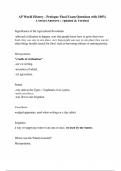
AP World History - Prologue Final Exam Questions with 100% Correct Answers | Updated & Verified
Significance of the Agricultural Revolution -allowed civilization to happen. now that people know how to grow their own food, they can stay in one place. now that people can stay in one place they can do other things besides search for food. such as becoming artisans or making pottery. Mesopotamia "cradle of civilization" -see 1st writing. -invention of wheel. -1st agriculture. Sumer -city state in the Tigris + Euphrates river system. -used cuneiform. -was first to use irrigation. Cun...
- Package deal
- Exam (elaborations)
- • 8 pages •
Significance of the Agricultural Revolution -allowed civilization to happen. now that people know how to grow their own food, they can stay in one place. now that people can stay in one place they can do other things besides search for food. such as becoming artisans or making pottery. Mesopotamia "cradle of civilization" -see 1st writing. -invention of wheel. -1st agriculture. Sumer -city state in the Tigris + Euphrates river system. -used cuneiform. -was first to use irrigation. Cun...
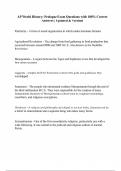
AP World History: Prologue Exam Questions with 100% Correct Answers | Updated & Verified
Patriarchy - A form of social organization in which males dominate females Agricultural Revolution - The change from food gathering to food production that occurred between around 8000 and 2000 B.C.E. Also known as the Neolithic Revolution. Mesopotamia - A region between the Tigris and Euphrates rivers that developed the first urban societies. ziggurats - temples built by Sumerians to honor the gods and goddesses they worshipped Sumerians - The people who dominated southern Mesopotamia throu...
- Package deal
- Exam (elaborations)
- • 5 pages •
Patriarchy - A form of social organization in which males dominate females Agricultural Revolution - The change from food gathering to food production that occurred between around 8000 and 2000 B.C.E. Also known as the Neolithic Revolution. Mesopotamia - A region between the Tigris and Euphrates rivers that developed the first urban societies. ziggurats - temples built by Sumerians to honor the gods and goddesses they worshipped Sumerians - The people who dominated southern Mesopotamia throu...
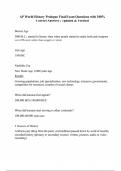
AP World History Prologue Final Exam Questions with 100% Correct Answers | Updated & Verified
Bronze Age 3000 B.C.; started in Sumer; time when people started to make tools and weapons out of Bronze rather than copper or stone Iron Age 1500 BC Neolithic Era New Stone Age, 6,000 years ago Results: Growing populations, job specialization, new technology, extensive governments, competition for resources, creation of social classes When did humans first appear? 200,000 BCE-100,000 BCE When did humans start moving to other continents? 100,000-60,000 years ago 3 Sources of History ...
- Package deal
- Exam (elaborations)
- • 23 pages •
Bronze Age 3000 B.C.; started in Sumer; time when people started to make tools and weapons out of Bronze rather than copper or stone Iron Age 1500 BC Neolithic Era New Stone Age, 6,000 years ago Results: Growing populations, job specialization, new technology, extensive governments, competition for resources, creation of social classes When did humans first appear? 200,000 BCE-100,000 BCE When did humans start moving to other continents? 100,000-60,000 years ago 3 Sources of History ...
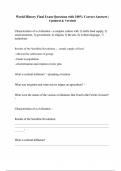
World History Final Exam Questions with 100% Correct Answers | Updated & Verified
Characteristics of a civilization - a complex culture with 1) stable food supply, 2) social structure, 3) government, 4) religion, 5) the arts, 6) written language, 7) technology Results of the Neolithic Revolution - - steady supply of food - allowed for settlement of groups - boom in population - diversification and creation of new jobs What is cultural diffusion? - spreading of culture What was irrigation and what was its impact on agriculture? - What were the names of the various civil...
- Package deal
- Exam (elaborations)
- • 11 pages •
Characteristics of a civilization - a complex culture with 1) stable food supply, 2) social structure, 3) government, 4) religion, 5) the arts, 6) written language, 7) technology Results of the Neolithic Revolution - - steady supply of food - allowed for settlement of groups - boom in population - diversification and creation of new jobs What is cultural diffusion? - spreading of culture What was irrigation and what was its impact on agriculture? - What were the names of the various civil...
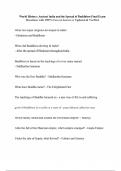
World History: Ancient India and the Spread of Buddhism Final Exam Questions with 100% Correct Answers | Updated & Verified
What two major religions developed in India? - Hinduism and Buddhism When did Buddhism develop In India? - After the spread of Hinduism throughout India. Buddhism is based on the teachings of a wise mane named - Siddhartha Gautama Who was the first Buddha? - Siddhartha Gautama What does Buddha mean? - The Enlightened One The teachings of Buddha focused on - a new way of life to end suffering goal of Buddhism is to achieve a state of - peacefulness called nirvana Which family united and...
- Exam (elaborations)
- • 3 pages •
What two major religions developed in India? - Hinduism and Buddhism When did Buddhism develop In India? - After the spread of Hinduism throughout India. Buddhism is based on the teachings of a wise mane named - Siddhartha Gautama Who was the first Buddha? - Siddhartha Gautama What does Buddha mean? - The Enlightened One The teachings of Buddha focused on - a new way of life to end suffering goal of Buddhism is to achieve a state of - peacefulness called nirvana Which family united and...
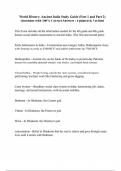
World History: Ancient India Study Guide (Part 1 and Part 2) Questions with 100% Correct Answers | Updated & Verified
This Exam includes all the information needed for the 6th grade and 6th grade honors social studies assessment on Ancient India. (The first and second parts
- Package deal
- Exam (elaborations)
- • 6 pages •
This Exam includes all the information needed for the 6th grade and 6th grade honors social studies assessment on Ancient India. (The first and second parts
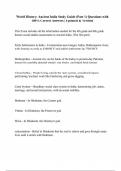
World History: Ancient India Study Guide (Part 1) Questions with 100% Correct Answers | Updated & Verified
This Exam includes all the information needed for the 6th grade and 6th grade honors social studies assessment on Ancient India. (The first part)
- Package deal
- Exam (elaborations)
- • 4 pages •
This Exam includes all the information needed for the 6th grade and 6th grade honors social studies assessment on Ancient India. (The first part)
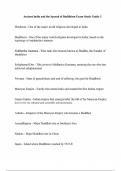
Ancient India and the Spread of Buddhism Exam Study Guide 3
Hinduism - One of the major world religions developed in India Buddhism - One of the major world religions developed in India, based on the teachings of Siddhartha Gautama Siddhartha Gautama - Wise man who became known as Buddha, the founder of Buddhism Enlightened One - Title given to Siddhartha Gautama, meaning the one who has achieved enlightenment Nirvana - State of peacefulness and end of suffering, the goal for Buddhists Mauryan Empire - Family that united India and created the first ...
- Package deal
- Exam (elaborations)
- • 3 pages •
Hinduism - One of the major world religions developed in India Buddhism - One of the major world religions developed in India, based on the teachings of Siddhartha Gautama Siddhartha Gautama - Wise man who became known as Buddha, the founder of Buddhism Enlightened One - Title given to Siddhartha Gautama, meaning the one who has achieved enlightenment Nirvana - State of peacefulness and end of suffering, the goal for Buddhists Mauryan Empire - Family that united India and created the first ...
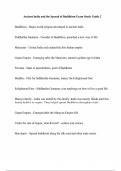
Ancient India and the Spread of Buddhism Exam Study Guide 2
Buddhism - Major world religion developed in ancient India Siddhartha Gautama - Founder of Buddhism, preached a new way of life Mauryans - United India and created the first Indian empire Gupta Empire - Emerging after the Mauryans, started a golden age in India Nirvana - State of peacefulness, goal of Buddhism Buddha - Title for Siddhartha Gautama, means 'the Enlightened One' Enlightened One - Siddhartha Gautama, wise teachings on how to live a good life Maurya family - India was united...
- Package deal
- Exam (elaborations)
- • 3 pages •
Buddhism - Major world religion developed in ancient India Siddhartha Gautama - Founder of Buddhism, preached a new way of life Mauryans - United India and created the first Indian empire Gupta Empire - Emerging after the Mauryans, started a golden age in India Nirvana - State of peacefulness, goal of Buddhism Buddha - Title for Siddhartha Gautama, means 'the Enlightened One' Enlightened One - Siddhartha Gautama, wise teachings on how to live a good life Maurya family - India was united...
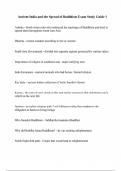
Ancient India and the Spread of Buddhism Exam Study Guide 1
Ashoka - South Asian ruler who embraced the teachings of Buddhism and tried to spread them throughout South East Asia Dharma - correct conduct according to law or custom South Asia Government - divided into separate regions governed by various rulers Importance of religion in southeast asia - major unifying roce Indo-Europeans - pastoral nomads who had horses. Spread religion Rig Veda - ancient Indian collection of Vedic Sanskrit Hymns Karma - the sum of one's deeds in this and earlier ex...
- Package deal
- Exam (elaborations)
- • 2 pages •
Ashoka - South Asian ruler who embraced the teachings of Buddhism and tried to spread them throughout South East Asia Dharma - correct conduct according to law or custom South Asia Government - divided into separate regions governed by various rulers Importance of religion in southeast asia - major unifying roce Indo-Europeans - pastoral nomads who had horses. Spread religion Rig Veda - ancient Indian collection of Vedic Sanskrit Hymns Karma - the sum of one's deeds in this and earlier ex...

Test Bank for Structure & Function of the Body 16thEdition Kevin T. Patton & Gary A. Thibodeau-Guaranteed Pass 2023
Good l highly recommend
TEST BANK FOR FOUNDATIONS OF MENTAL HEALTH CARE 6TH EDITION BY MORRISON VALFRE
ATI PN CAPSTONE COMPREHENSIVE TEST B PROCTORED FINAL EXAM
ATI MED-SURG PROCTORED EXAM TEST BANK LATEST 2023 (NEW) WITH REVISED AND FULL 100% CORRECT ANSWERS
NSG 6420 APEA PREDICTOR EXAM 2024-2025 REAL EXAM QUESTIONS AND CORRECT ANSWERS WITH RATIONALES | ALREADY GRADED A+ | BRAND NEW!!